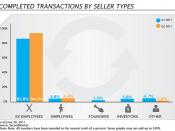A start-up corporation may have its inception through privately invested funds or through procuring funds through a venture capital firm or a composite of both funding sources. Venture capital is defined as "money invested to finance a new firm" (Brealey, 2004). Venture capitalists often hold seats on the company's board of directors and provide input in the composition of the senior management team that leads the company. In the chronological development of a successful company, likely there will come a time when growth opportunities and expansion plans call for more capital than can reasonably be obtained through continued investment by venture capitalists. How does a company raise the capital it needs to continue its development? One option is to sell shares in the company to the public, which is an "initial public offering (IPO)" (Brealey, 2004).
Google's decision to expand and acquire a larger customer base led to their IPO on August 19, 2004.
The difficulties faced by Google are no exception, many companies struggle with the decision of going public and timing. The loss of some control and the requirements can deter some companies from taking that leap, as is illustrated each step in establishing an IPO below. In this paper we will briefly discuss the financing issues that come about when a company goes public. There are many items to be aware of when a company makes this decision to go public. A company needs to understand the process of issuing securities, ways to advertise the stock before it is sold, getting the names straight on the newly issued stocks, the basics of underwriting and the different types of underwriting agreements. These are the staples that an organization needs to be informed on in order to start successfully. We will also address registration, disclosure and compliance issues, the...


